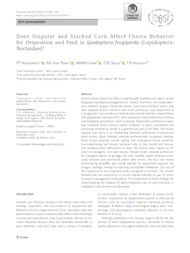Does singular and stacked corn affect choice behavior for oviposition and feed in Spodoptera frugiperda (Lepidoptera: noctuidae)?
Does singular and stacked corn affect choice behavior for oviposition and feed in Spodoptera frugiperda (Lepidoptera: noctuidae)?
Autoria: NASCIMENTO, P. T.; VON PINHO, R. G.; FADINI, M. A. M.; SOUZA, C. S. F.; VALICENTE, F. H.
Resumo: Little is known about the effects of genetically modified corn plants on the foraging of Spodoptera frugiperda (J.E. Smith). Therefore, this study examines whether singular herbicide-tolerant and insect-resistant plants and their stacked events interfere with food reference and oviposition of S. frugiperda. Two non-Bt corn hybrids and three Bt-hybrids, some of them with glyphosate tolerance (GT), were evaluated. Food preference of larvae and biological parameters were assessed. Oviposition preference bioassays involved choice and no choice condition in plants uninfested and previously infested by larvae in a greenhouse and in the field. The results indicate that there is no relationship between preference of larvae and adult moths. Adult females selected preferentially transgenic hybrids, while larvae selected non-Bt hybrid. Fall armyworm larvae avoid Bttoxin-expressing leaf tissues, survived only on the non-Bt leaf tissues, and showed minor differences in other life-history traits reared on GT and non-transgenic corn leaf tissues. Female moths showed preference for transgenic plants to lay eggs, but with variable output between previously infested and uninfested plants with larvae. The fact that moths preferred Ag 3700RR2 and non-Bt hybrids for oviposition supports the refuge?s strategy aiming at producing susceptible individuals. The use of this hybrid must be integrated with a program of control. The results showed also the importance of correct hybrid selection as part of insect resistance management to Bt-plants. The implications of these findings for understanding the impacts of plant-mediated cues on pest behavior in transgenic crop systems are discussed.
Ano de publicação: 2020
Tipo de publicação: Artigo de periódico
Unidade: Embrapa Milho e Sorgo
Palavras-chave: Desempenho reprodutivo, Interação inseto-planta, Planta Transgênica, Praga de Planta, Verme
Observações
1 - Por padrão são exibidas publicações dos últimos 20 anos. Para encontrar publicações mais antigas, configure o filtro ano de publicação, colocando o ano a partir do qual você deseja encontrar publicações. O filtro está na coluna da esquerda na busca acima.
2 - Para ler algumas publicações da Embrapa (apenas as que estão em formato ePub), é necessário ter, no celular ou computador, um desses softwares gratuitos. Sistemas Android: Google Play Livros; IOS: iBooks; Windows e Linux: software Calibre.
Acesse outras publicações
Acesse a Base de Dados da Pesquisa Agropecuária (BDPA) para consultar o acervo completo das bibliotecas da Embrapa.

